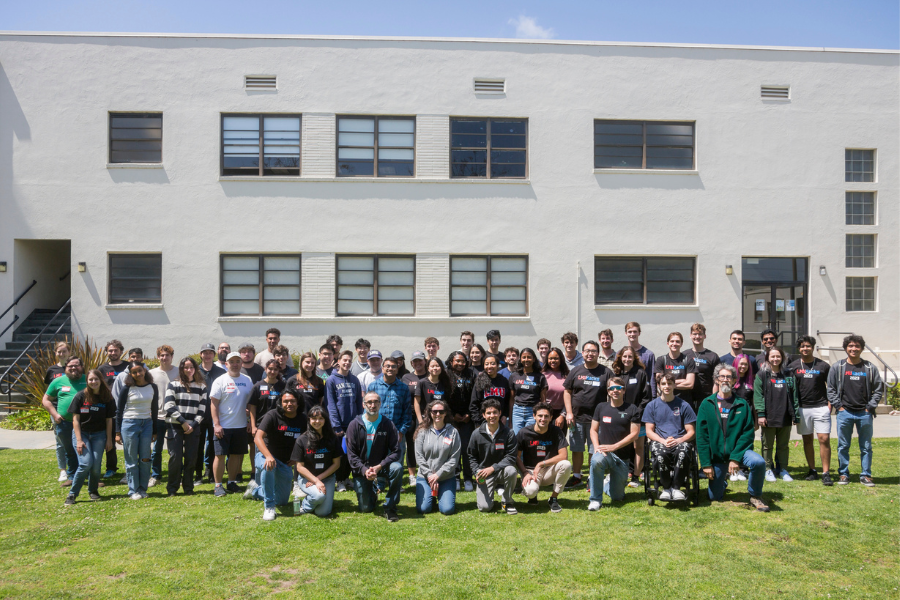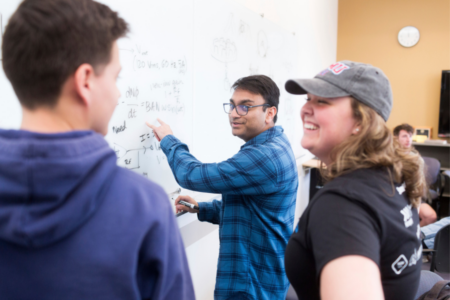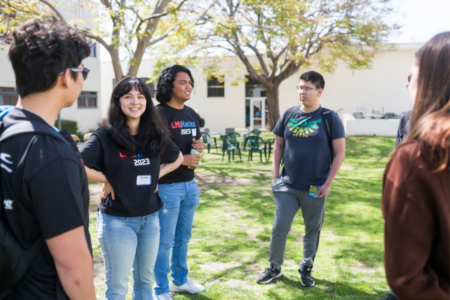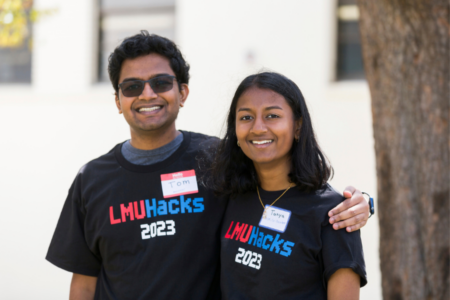
Loyola Marymount University computing and engineering student organizations joined together this spring to host LMUHacks 2023: Hack for Good, the first in-person hackathon held on LMU’s Westchester campus since before the pandemic. Teams worked over the course of a day to conceptualize, develop and present a project, as well as network and connect with other LMU students and company sponsors. This year, company sponsors included TechEmpower, PacketFabric, and LMU Business Incubator company Kropply.

“If there’s something that students have always wanted to do, but haven’t yet done in class, LMUHacks gives them a safe space to try it,” said Tanya Nobal ‘23, computer science major, co-president of LMU’s chapter of the Association for Computing Machinery and one of the event’s main organizers.
Nobal and co-president Jason Douglas ‘23, also a computer science major, developed the theme for this year’s event: hacking for good. They drew inspiration from a virtual hackathon they participated in during the pandemic where teams were encouraged to create projects that would help people who were more heavily affected by Covid. They defined ‘hacking for good’ using the United Nations’ 17 Sustainable Development goals, all while allowing teams to explore the flexibility of the theme. “We wanted to make sure that teams could interpret the theme in any direction, which is why we saw projects like natural language processing, games, and webapps,” said Douglas.
This year, teams could compete in three tracks: freshman and transfer computer science students, general computer science, and engineering. Judges evaluated projects based on engineering, success, opinion, usability, and presentation. Winning teams were selected from each track, with one team winning best overall.

The project that won best overall was an app called News Aggregator, developed to combat the spread of false and biased information. A user could input an article into the News Aggregator, and the app would search the web for similar articles and create a summary. “If you take a summary of all the articles, the idea is that you would get just the facts instead of opinions,” explained Nobal. The team members included Nicolas Ortiz (Computer Science ‘25), Lucian Prinz (Computer Science ‘25), Scott Nelson (Psychology ‘23), and Ariel Kanevsky (Computer Science ‘24).
“We saw some really impressive projects come out of the freshman track,” said Douglas. The winning team made a website to help people find local foodbanks. “It blew the judges away.”
The winning project in the general computer science track was an app that used AI to help users find places to recycle different items. In the engineering track, the winning team designed a hamster wheel capable of generating renewable energy.
Nobal and Douglas are already considering volunteering at next year’s hackathon, and they encourage anyone who has never participated in a hackathon to sign up. “You really don’t know what you’re capable of, what you can make, what you can achieve, unless you take that first step forward by signing up for that hackathon,” said Douglas. “Our biggest goal is to have people learn and to grow.”

“If there’s anything we want people to know, it’s don’t be afraid to try,” said Nobal.
Nobal and Douglas credit much of this year’s success to everyone who took part in the event. About 40 students participated, and nearly 20 more volunteers (made up of faculty, alumni, and sponsors) provided sponsorship, mentored students during the event, ran workshops, judged the final projects, and assisted the ACM executive board with planning the event.
The event was also hosted by the LMU chapters of the Institute of Electrical and Electronics Engineers, the Society of Women Engineers, the National Society of Black Engineers, and Quality of Life+.
By Noémie Boucher ’25



